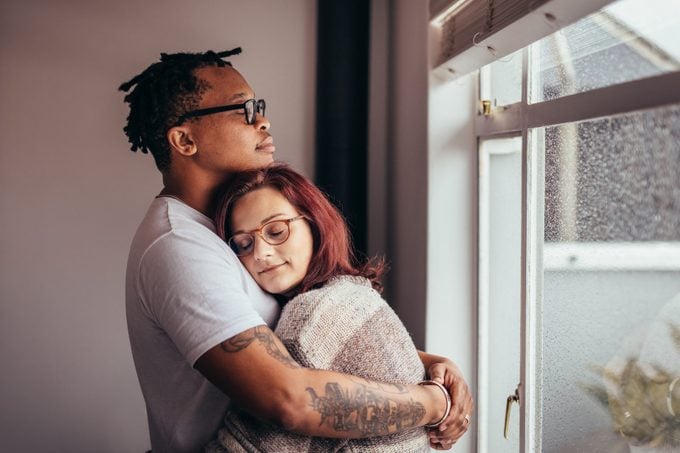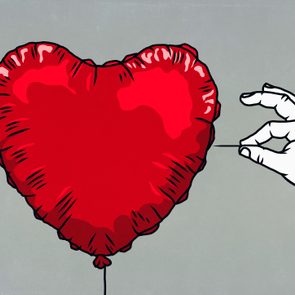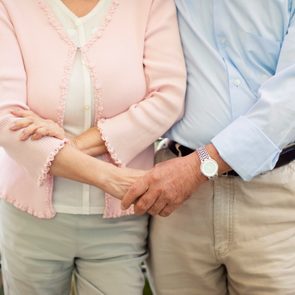Healthy vs. Unhealthy Relationships: How to Tell the Difference
Updated: Jun. 30, 2022
Experts reveal how to tell the difference between a healthy vs. unhealthy relationship, when to seek professional help, and when to end one.
Our editors and experts handpick every product we feature. We may earn a commission from your purchases.
Healthy vs. unhealthy relationships
If you’ve ever (perhaps jealously) observed happy couples and thought they had a perfect healthy relationship, you may have been surprised the first time you saw them disagree or learned, in confidence, about deeper issues in the relationship. By contrast, you know unhealthy relationships when you see them: The constant gaslighting, the micro-cheating, the hiding, and the lying are hard to ignore. (These are the worst relationship lies you can tell.)
The truth is, all relationships have issues, even the healthy ones. But while it might seem easier to diagnose the relationships of others it might feel more difficult to play doctor with your own partnership.
In fact, while it can be difficult to identify a relationship’s strengths from the inside, there are certain tells you can look for.
“When an individual has a solid understanding of who they are and knows how to effectively communicate that to their partner, they’re also more likely to be more understanding of who their partner is as well, and respect them even when differences arise,” says Danielle Laura, relationship counselor and author of Dear Love, I’m Ready for You. (Here are some communication tips you can try.)
Other important aspects include knowing your dominant personality type, as well as your communication style and your attachment style, explains Laura. “These are the aspects that, if understood and embodied, lead to long-term mutual fulfillment in a relationship.” (Here are the other characteristics of a healthy relationship.)
By having a better sense of who you and your partner are, not to mention how you best relate to each other, you can get a head start on identifying trouble and nipping it in the bud.
Here, credentialed relationship experts answer more questions about how to distinguish healthy relationships from unhealthy ones.
(According to science, these are the five factors linked to successful relationships.)

What makes a healthy relationship?
So many little details and factors go into a healthy relationship, and, of course, the chemistry is different from person to person and couple to couple. But in general, says Sofia Robirosa, licensed marriage and family therapist in Florida, a healthy relationship balances a combination of great friendship, attention to physical intimacy, and effective communication. (Also, did you know friends improve relationships?)
“Many couples start with all of these elements; so it is also important to understand that we will have ebbs and flows in any long-term relationship, and as such, remaining flexible and having the mindset of wanting to work things out are important elements seen in healthy relationships,” explains Robirosa.
In other words, just because your relationship isn’t perfect doesn’t mean it’s not healthy—as long as you’re both willing to work at it.
And one thing that all healthy relationships have in common is solid communication. “Communication is a vital element to emotional intimacy in a relationship,” Robirosa says. “Being able to express our emotions, what we want and need, share dreams, and resolve conflict are key elements of a healthy relationship, for which all require to communicate effectively.” (As far as communicating, here’s when texting is better than calling.)
What makes for an unhealthy relationship?
There are many signs, both subtle and overt, that point to an unhealthy relationship, says Jessica Griffin, licensed clinical and forensic psychologist, associate professor of psychiatry and pediatrics at the University of Massachusetts Medical School in Worcester.
Chief among them are feeling like you’ve lost your personal spark and self-worth, feeling unusually sad or anxious, and feeling like you’re going crazy or being gaslit frequently.
In an emotionally abusive relationship, your self-worth is slowly eroded over time, Griffin explains, with people often humiliated, demeaned, or made to question whether they’re lovable. (Here are some abusive relationship quotes to help you move on.)
“Emotional abusers break you down, over time, and put themselves in the position so that they are the only ones who can build you back up again. By feeling “not good enough,” you are more likely to stay in an unhealthy, emotionally abusive relationship—something that emotional abusers know all too well and use to their advantage,” says Griffin, who is also the executive director of the Child Trauma Training Center and executive director at the national Resilience Through Relationships Center at the university.
Griffin points to getting sick more often and hiding things from your partner out of fear as other signs of an unhealthy relationship.
“Emotional abuse can have negative physiological effects, right down to your DNA. Those in long-term psychologically abusive relationships are exposed to ongoing toxic stress from emotional abuse. This stress on the body manifests itself as increased headaches, stomachaches, increased inflammation in the body, and compromised immune systems.”
If you feel like you need to hide your accomplishments or whereabouts because of a lack of support or feelings of jealousy from your partner, these are other classic signs worth paying careful attention to, Griffin warns. (These are the arguments that end relationships.)
What to do when a relationship is irretrievably unhealthy and broken
If you’re constantly made to feel like you’re going crazy, it may be time to get out. Griffin points to gaslighting as a classic sign of unhealthy relationships.
“Victims of emotional abuse are often labeled by their partners as ‘crazy,’ ‘too emotional,’ or ‘oversensitive,'” says Griffin, explaining that emotional abusers are skilled in distorting reality and leaving you to question your own sanity: something known as gaslighting.
“They may do or say something, then overtly deny these statements or behavior and then accuse you of making this up in your head (e.g., “I never did that,” “You aren’t remembering that correctly,'” explains Griffin, adding, “Emotional abusers may call you names—”disgusting,” “loser,” “fat,”—and then later tell you that they were “joking” or you misunderstood them.” (These are the gaslighting phrases that are red flags.)
Unfortunately, it is absolutely possible for a relationship to get to the point where it’s not fixable, agrees Leslie Montanile, a matrimonial lawyer in New York.
“The point of no return is when one or both partners simply refuses to let go of the past, or continues to assign blame instead of working together on the possibilities of the future. There must be a conscious decision to be united as a team to move forward in the hopes of rebuilding a once-thriving loving relationship,” he says.
That team part is key. There isn’t one “good” and “bad” person in a relationship. Often there can be a bit of both in both people in relationships that are failing. Don’t deter from doing the work of improving the relationship by placing total blame on your partner.
(Here’s how to rebuild trust in a relationship.)
Being agreeable and avoiding fights: Healthy or unhealthy?
When most of us think of healthy relationships, we picture partnerships without any conflict. But, according to experts, this is not only unrealistic but also unnecessary.
“While being assertive is understandably very hard, when it comes to relationships, opting into honesty and navigating conflict is necessary,” says Jor-El Caraballo, co-founder of New York City mental health practice Viva Wellness.
Because people can be naturally inclined to avoid conflict, this can easily lead to resentment and passive aggression. (Beware of these signs of passive-aggressive behavior.)
“This can seriously erode relationships over time and unintentionally cause the exact harm that we try to avoid when opting out of fights,” Caraballo says.
Talk it out
He recommends discussing and exploring things head-on, especially when it’s an issue important to one partner, which can lead to growth opportunities, as well as increased intimacy and understanding. “Fights or disagreements in relationships are normal and healthy when handled with respect and honest communication,” Caraballo says.
(Here are some relationship communication quotes that will inspire you to speak up and listen to your partner.)
Do avoid petty fights
Of course, not all conflict is created equal. Some smaller issues might be best left alone.
“It’s healthy to avoid petty fights: Choose your battles!” says Rori Sassoon, co-owner of matchmaking agency Platinum Poire and author of The Art of the Date. Sassoon agrees that avoiding fights to cover up larger issues, however, leads to problems and passive-aggressive behavior.
“Being passive-aggressive is dangerous because if you bottle things up for too long, eventually it all comes spilling out quite suddenly! And usually, it happens with something that is insignificant—i.e. your partner forgot to take out the trash that night,” she says. (Here are the telltale signs you’re in a toxic relationship.)
Do confront larger issues
While it’s OK to let minor things slide, according to Sassoon, it’s recommended to confront larger issues, even if it means risking a minor fight. “Chances are you’ll be able to resolve it better if you face it head-on rather than letting it fester inside,” she says.
Brutal honesty: Too much, or necessary?
If honesty is something repeatedly cited as critical in a healthy relationship, it stands to reason that no-holds-barred, warts-and-all, brutal honesty is even better, right? Not necessarily, experts say.
One person’s brutal honesty could be another person’s clear communication, explains Caraballo. (You could also write it down. Here are therapists’ tips to start a journal.)
Engage in assertive communication
“While as a therapist I think it’s always better to opt for assertive communication versus a more aggressive style, we all have different boundaries and lines when it comes to that,” Caraballo says.
Because some people are more sensitive than others, while honesty is usually warranted, sometimes it’s better without the side of “brutal.”
“Does your partner bristle when you offer feedback? Maybe it’s time to check in and see if there’s a more effective way to meet each other in the middle,” Caraballo says.
Sassoon agrees that honesty is OK, as long as it’s not too tough.
“That gets you nowhere! It’s all about how you frame something. The package should always be prettier than the content. So if there is something you need to be honest about, do not just blurt it out unfiltered! Use your emotional intelligence and choose your words wisely.” (These are the types of anger to look out for.)
When to seek professional help
If you’re in an unhealthy relationship with emotional abuse, it’s imperative to connect with somebody else, whether a friend, family member, or professional who specializes in interpersonal violence, says Griffin.
“Although we all may do or say things we regret in relationships, emotional abusers show a pattern of behavior over time and are usually unable to genuinely take responsibility and accountability for this behavior,” Griffin explains. (Here’s how to find a therapist.)
They blame you or others for their behavior
“Rather than show remorse or regret, they blame you or others for their behavior and are unwilling to seek help to change their behavior. Documenting or journaling this behavior may help you see this pattern over time,” says Griffin, stressing the importance of keeping the journal in a private place that your partner cannot access. (Look for these domestic violence signs.)
For people stuck in abusive relationships—whether physical or emotional—Griffin also recommends resources like the National Domestic Violence hotline and the website End Domestic Abuse.
If you thought about it, you probably need it
If you’ve started to think you might need professional help, you probably already do, Caraballo points out. “While there’s no wrong time to seek out professional support, what we do know is that most people wait too long to seek out therapy due to mental health stigma,” he says. (Here are the signs that therapy is working.)
Caraballo advises seeking out support from a professional to make the best decisions not only for your relationship but for you, too. “As scary as it can be, therapy can be an incredibly effective tool on taking those next steps, whatever they may be,” he says. (Here are more tips for fixing a broken relationship.)
Note that you don’t necessarily need a problem in order to seek out couples’ therapy. Sometimes, people will seek out therapy at certain critical points in their lives or relationships (like when first getting married or having a baby) just to learn more about how to create an environment of positive and open communication.
When to end an unhealthy relationship
When the relationship is obviously in need of careful attention and yet one partner refuses help, this is a red flag that you may be headed for a divorce, explains Montanile.
“In this case, it would be good to evaluate your relationship and get a clear picture as to what the future may hold for you. If you believe that you are at an impasse that can not be changed, you may want to get your ducks in a row and start planning for a different life that does not include your current partner,” says Montanile.
You’re no longer on the same team
A feeling of being on the same team and willingness to evolve together are both important. “A relationship will naturally end, despite staying together, when you are no longer willing to grow as a team and share your life’s dreams, hopes, fears, and desires,” explains Montanile.
“Your partner’s behavior may have changed such that you suspect they may have spoken with a lawyer concerning a possible divorce. If this is the case, you may also want to talk to a lawyer to pose questions about the unknown so that you can be prepared for an end that may be inevitable,” says Montanile.
And while in a perfect world all couples could adhere to the “in sickness and in health” adage, even though residual love may remain despite your issues, it may be time to move on when enduring hurt feelings become too great to ignore or work through. “When the pain of the relationship is much greater than what the relationship offers, then it’s time to walk away,” Sassoon says.
She adds: ‘You cannot live your life walking on eggshells, or being resentful, or whatever else it may be. You need to end things if the overall benefits of the relationship are greatly overshadowed by negative actions or feelings.” (Here’s how to love yourself.)
But remember, improvement is possible
However, if you are both willing to work on yourself and grow together, says Robirosa, improvement is possible. “I have seen first-hand couples changing their relationships for the better, even when they were one step away from filing for a divorce. When there is willingness, there is a way.”
Next, read about the quick habit that improves relationships.





















